LeetCode in Kotlin
3245. Alternating Groups III
Hard
There are some red and blue tiles arranged circularly. You are given an array of integers colors and a 2D integers array queries.
The color of tile i is represented by colors[i]:
colors[i] == 0means that tileiis red.colors[i] == 1means that tileiis blue.
An alternating group is a contiguous subset of tiles in the circle with alternating colors (each tile in the group except the first and last one has a different color from its adjacent tiles in the group).
You have to process queries of two types:
queries[i] = [1, sizei], determine the count of alternating groups with sizesizei.queries[i] = [2, indexi, colori], changecolors[indexi]tocolori.
Return an array answer containing the results of the queries of the first type in order.
Note that since colors represents a circle, the first and the last tiles are considered to be next to each other.
Example 1:
Input: colors = [0,1,1,0,1], queries = [[2,1,0],[1,4]]
Output: [2]
Explanation:
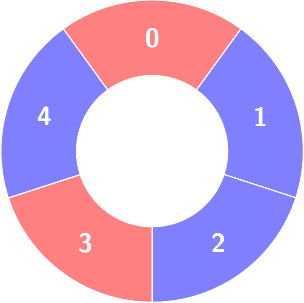
First query:
Change colors[1] to 0.
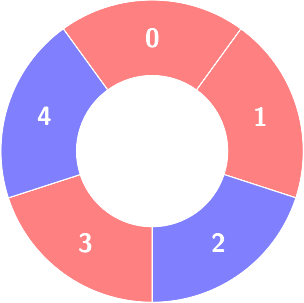
Second query:
Count of the alternating groups with size 4:
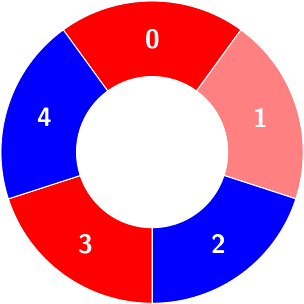
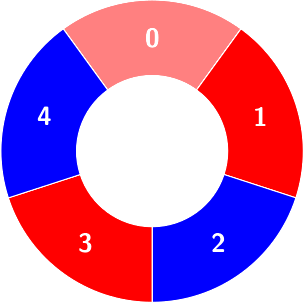
Example 2:
Input: colors = [0,0,1,0,1,1], queries = [[1,3],[2,3,0],[1,5]]
Output: [2,0]
Explanation:
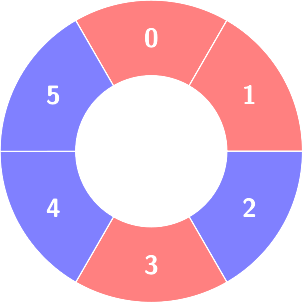
First query:
Count of the alternating groups with size 3:
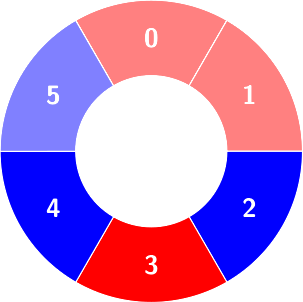
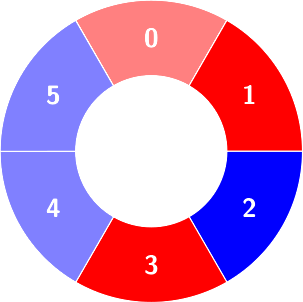
Second query: colors will not change.
Third query: There is no alternating group with size 5.
Constraints:
4 <= colors.length <= 5 * 1040 <= colors[i] <= 11 <= queries.length <= 5 * 104queries[i][0] == 1orqueries[i][0] == 2- For all
ithat:queries[i][0] == 1:queries[i].length == 2,3 <= queries[i][1] <= colors.length - 1queries[i][0] == 2:queries[i].length == 3,0 <= queries[i][1] <= colors.length - 1,0 <= queries[i][2] <= 1
Solution
import java.util.BitSet
class Solution {
fun numberOfAlternatingGroups(colors: IntArray, queries: Array<IntArray>): List<Int> {
val n = colors.size
val set = BitSet()
val bit = BIT(n)
for (i in 0..<n) {
if (colors[i] == colors[getIndex(i + 1, n)]) {
add(set, bit, n, i)
}
}
val ans: MutableList<Int> = ArrayList<Int>()
for (q in queries) {
if (q[0] == 1) {
if (set.isEmpty) {
ans.add(n)
} else {
val size = q[1]
val res = bit.query(size)
ans.add(res[1] - res[0] * (size - 1))
}
} else {
val i = q[1]
var color = colors[i]
if (q[2] == color) {
continue
}
val pre = getIndex(i - 1, n)
if (colors[pre] == color) {
remove(set, bit, n, pre)
}
val next = getIndex(i + 1, n)
if (colors[next] == color) {
remove(set, bit, n, i)
}
colors[i] = colors[i] xor 1
color = colors[i]
if (colors[pre] == color) {
add(set, bit, n, pre)
}
if (colors[next] == color) {
add(set, bit, n, i)
}
}
}
return ans
}
private fun add(set: BitSet, bit: BIT, n: Int, i: Int) {
if (set.isEmpty) {
bit.update(n, 1)
} else {
update(set, bit, n, i, 1)
}
set.set(i)
}
private fun remove(set: BitSet, bit: BIT, n: Int, i: Int) {
set.clear(i)
if (set.isEmpty) {
bit.update(n, -1)
} else {
update(set, bit, n, i, -1)
}
}
private fun update(set: BitSet, bit: BIT, n: Int, i: Int, v: Int) {
var pre = set.previousSetBit(i)
if (pre == -1) {
pre = set.previousSetBit(n)
}
var next = set.nextSetBit(i)
if (next == -1) {
next = set.nextSetBit(0)
}
bit.update(getIndex(next - pre + n - 1, n) + 1, -v)
bit.update(getIndex(i - pre, n), v)
bit.update(getIndex(next - i, n), v)
}
private fun getIndex(index: Int, mod: Int): Int {
val result = if (index >= mod) index - mod else index
return if (index < 0) index + mod else result
}
private class BIT(n: Int) {
var n: Int = n + 1
var tree1: IntArray = IntArray(n + 1)
var tree2: IntArray = IntArray(n + 1)
fun update(size: Int, v: Int) {
var i = size
while (i > 0) {
tree1[i] += v
tree2[i] += v * size
i -= i and -i
}
}
fun query(size: Int): IntArray {
var count = 0
var sum = 0
var i = size
while (i < n) {
count += tree1[i]
sum += tree2[i]
i += i and -i
}
return intArrayOf(count, sum)
}
}
}

